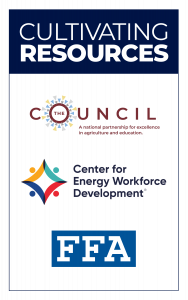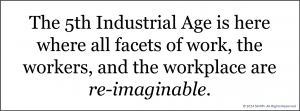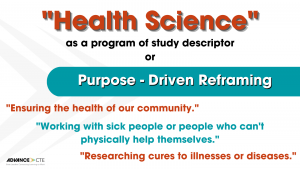 The National Council for Agricultural Education (NCAE) and the Center for Energy Workforce Development (CEWD) have been working together to prepare for the new Energy and Natural Resources Career Cluster and the modernized Agriculture Career Cluster. Both clusters are part of the proposed Cultivating Resources Cluster Grouping that will be released this month.
The National Council for Agricultural Education (NCAE) and the Center for Energy Workforce Development (CEWD) have been working together to prepare for the new Energy and Natural Resources Career Cluster and the modernized Agriculture Career Cluster. Both clusters are part of the proposed Cultivating Resources Cluster Grouping that will be released this month.
Here’s what we have learned:
In partnerships there is strength.
This lesson has remained constant in our collaboration. We have focused on the power of what will be created from two Clusters and how our industries can partner to benefit learners, educators, and each industry. We don’t look at the new Cluster structures as an either/or, but rather an opportunity for powerful integration of careers and workforce development NCAE and CEWD are exploring how they can collaborate beyond the clusters so that “one plus one equals the power of three” for two industries essential to our country.
What’s old is old again, until it’s new.
NCAE has shared learnings from “energy and natural resources” sitting historically within the agricultural cluster, preparing CEWD to take the baton for the new stand-alone cluster. CEWD, in turn, is using those lessons to make adjacent recommendations for the new Cluster, creating a Framework that will be familiar to instructors and learners. Meanwhile, NCAE is focusing on supporting state and local leaders, as well as agriculture educators with essential resources. While both groups are allowing history (the old) to guide the future, this watershed moment will infuse fresh and modernized teachings (the new) into what will soon be two clusters. A national Framework for the new Energy and Natural Resources Cluster for high school classrooms is expected to be available by the end of 2024 or early in 2025. The Framework for post-secondary and K-8 classrooms will follow shortly thereafter.
Similarities are more significant than differences.
Differences between agriculture and energy are obvious on a broad level. The similarities between the two are less apparent, but notable in comparison.
- Both industries focus on inputs to drive outputs, on the technology side of the house, but also on the importance of investments into people to drive innovation and progress.
- A commitment to service drives professionals in both spaces – service to community, service to country, and service to their professions.
- The public relies on professionals in both career paths but doesn’t really understand – or fully appreciate – the complexities and technical prowess required of those who do the work in these fields. The modernized framework will hopefully help change that, allowing classroom lessons to be both deeper and wider.
- Both industries steward our natural resources to produce food, fiber, fuel, and energy. The land and its long-term productivity are central to both industries.
- Agriculture and energy center on efficiency. In agriculture, growers and farmers strive to improve efficiency through technological innovations. The same is true in the energy sector.
NCAE and CEWD are proud of the lessons we are learning and the impact that will be felt as we collaboratively build skilled diverse talent pipelines for the future.
The views, opinions, services, and products shared in this post are solely for educational purposes and do not imply agreement or endorsement by Advance CTE, nor discrimination against similar brands, products, or services not mentioned.





 Kevin Imes’ 36-year career in public education covers a diverse range of experiences. From the beginning of his career as a Biology teacher in downtown Phoenix schools to his role in opening a magnet program, an alternative school, a comprehensive high school and a public CTE district from the ground up, Kevin’s expertise in program development lends itself well to his new position as State CTE Director.
Kevin Imes’ 36-year career in public education covers a diverse range of experiences. From the beginning of his career as a Biology teacher in downtown Phoenix schools to his role in opening a magnet program, an alternative school, a comprehensive high school and a public CTE district from the ground up, Kevin’s expertise in program development lends itself well to his new position as State CTE Director.